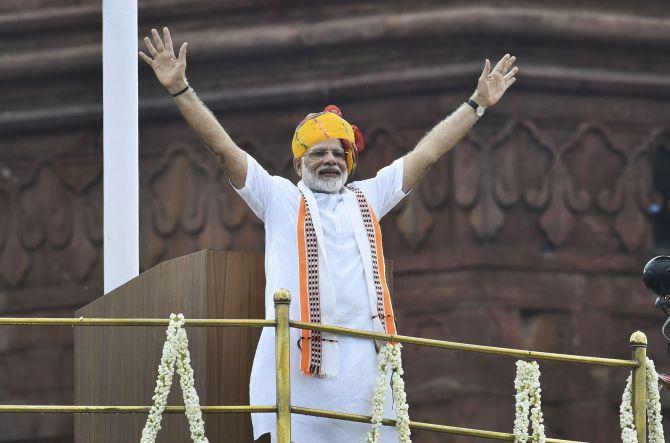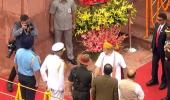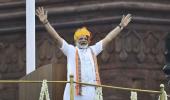'Speaking this year from the ramparts of the Red Fort, he excelled himself in content, diction and delivery -- all extemporaneously flowing, replete with felicitous expressions and captivating word play.
'The only other Indian prime minister with whom he stands comparison is Jawaharlal Nehru who too shunned prepared speeches and established instant rapport with his audiences,' says B S Raghavan.

I must be one of the few living to have heard all the Independence Day speeches of all the Indian prime ministers beginning from Jawaharlal Nehru in 1947.
I certainly was one of the few living to have been part of the team which put together the Independence Day speeches of Lal Bahadur Shastri and Indira Gandhi in the years 1964-69.
I can asseverate with full conviction that this year’s Independence Day speech by Narendra Damodardas Modi is the best that I have heard.
Of course, Modi is nonpareil in his oratorical eloquence and in the art and science of effective communication.
But speaking this year from the ramparts of the Red Fort, he excelled himself in content, diction and delivery -- all extemporaneously flowing, replete with felicitous expressions and captivating word play.
The only other Indian prime minister with whom he stands comparison is Jawaharlal Nehru who too shunned prepared speeches and established instant rapport with his audiences.
Nehru, however, was given too much to generalities, whereas Modi is crystal-clear, crisp, specific and relevant both in the goals he sets for the country and in the inspiring language in which he sets them, evocatively linking them to great names and great occasions.
For instance, whereas all other prime ministers before him indulged in vague and airy-fairy blah-blahs, Modi, in his very first Independence Day address in 2014, brought up the importance of toilets and cleanliness and pledged his government to a nationwide plan of action by undertaking sustained and vigorous measures.
That speech became equally memorable for his rousing “Make in India” call. The announcements he makes and agenda he sets for himself and his government are evidence of the thorough preparation and hard-nosed homework that go into them.
While this is generally true for all his past addresses, this year stands out for some highly impactful announcements.
Heading the list is the long overdue decision to have a chief of defence staff.
Beginning from the chairman of the joint chiefs of staff of the US going back to the 1940s and a chief of defence staff of Britain, instituted in 1959, there are similar posts in all advanced industrialised countries, which have found the post to be essential for defence planning and preparedness and effective coordination among the different Services in respect of intelligence and operations.
The recommendation that India should have one emanated in 1966 from the Political and Security Policy Planning Directorate of which I was in charge, and the Kargil Committee only reiterated that recommendation.
This year’s Independence Day address is notable for Modi’s strongly worded stress for the first ever time from the prime minister’s level and on such a momentous occasion, on the imperative need to take steps to counter the population explosion.
For far too long, the government had been soft-pedalling this perturbing feature of India’s polity, without coming out boldly in favour of vigorous measures to contain and reduce population, which is uncontrolled in states like Bihar, Madhya Pradesh, Rajasthan and Uttar Pradesh (the so-called BIMARU states).
Modi’s unequivocal pronouncement should help put all the government’s weight behind efforts to reverse the trend, based on some of the policies found effective in countries like China.
Sustainable development is impossible and rapid exhaustion of resources inevitable without bringing down population level. It is heading towards catastrophic proportions and without reining it in in the shortest possible term, all the dreams Modi was talking of will become nightmares.
The vigorous push to be given to the expansion and strengthening of infrastructure with an allocation of Rs 100 trillion and to Jal Jeevan Mission to carry piped water to every household with an allocation of Rs 3.5 trillion is yet another indication of concrete goal setting by Modi which is the hallmark of his leadership.
I was intrigued to find him quoting in Tamil a little-known but the most appropriate couplet from Thirukkural of Thiruvalluvar, who had categorically asserted 3000 years ago that there was no well-being and survival without water which, he averred, was indeed the foundation of stability and order in society itself.
If I were asked to choose, from among all the commitments that Modi has made in his speech, the most cardinal one having a vital bearing on empowering the citizens to scale pinnacles of achievement, I would unhesitatingly plump for his highly imaginative and empathetic undertaking to guarantee ease of living.
The oppression, harassment and humiliation that a citizen experiences in his dealings with government agencies in India are such that he simply dreads having anything to do with a government office or a government official.
Modi will earn the eternal gratitude of the average citizen and householder if he effectively carries out his pledge to remove, as he put it, “excess domination of the governments over people's lives” so that they have the freedom of pursuing their aspirations and rise to their full potential.
This is how, in his address, he graphically and sensitively portrays the rising expectations of the people:
“People's thinking has changed. Earlier, people were happy with merely a railway station or bus station. Now they ask: When will Vande Bharat Express come to my area, when is a good airport coming? Earlier the aspiration was to have a good mobile phone but now, people aspire better data speed..
"India cannot be content with incremental progress. A high jump is needed, our thought process and vision have to match the people’s aspirations. A change in the mindset at all levels of government and society has to be brought about. We have to keep in mind global best practices and build good systems.”
What distinguishes him from other heads of government India has had is his drive and keenness to deliver on the commitments he makes.
All reports are that he keeps his ministers on their toes by constantly goading them to higher levels of performance and by monitoring and reviewing the progress of ongoing projects at frequent intervals.
All told, Modi has emerged as an inspirational leader who has the right priorities, right goals and right policy responses.
Through his Independence Day address, he has left his ministers, policy-makers, public servants and the civil society in no doubt about his earnestness to bring to fruition his vision of New India in the forging of which, one hopes, they will be full-blooded and willing participants.
Great as the speech was in many respects, it was marred by Modi's omission of mention of Jawaharlal Nehru, while he had fulsome praise for "Bapu" Gandhi, Sardar Patel and Baba Ambedkar. This made the omission glaring and left no doubt that it was also deliberate.
Regrettably, there is a certain degree of pettiness among the BJP-RSS votaries that makes them refuse to acknowledge Nehru's monumental contribution towards nurturing and strengthening India's democratic institutions and building up a modern India with a scientific temper.
Their dislike of Nehru derives from a complex mix of many factors, but essentially, I suspect, it is because of the general view among them that Nehru went out of the way to mollycoddle Muslims.
Whatever be one's views with regard to the actions of Gandhi, Nehru, Patel, Rajendra Prasad, Rajaji and others at the time of Independence, besieged as they were by challenges and crises at the most dangerous time in the country's history, one should not forget the deep love they had for the country and the great sacrifices they made in the case of freedom.
B S Raghavan is a former member of the Indian Administrative Service who was director, political and security policy planning and in charge of the National Integration Council secretariat in the central government when Jawaharlal Nehru, Lal, Bahadur Shastri and Indira Gandhi were prime ministers. He was also the Policy Adviser to UN(FAO) and US Congressional Fellow.










